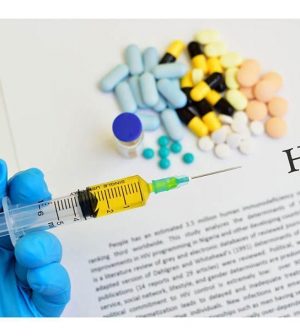- 8 Ways to Increase Dopamine Naturally
- 7 Best Breads for Maintaining Stable Blood Sugar
- Gelatin vs. Collagen: Which is Best for Skin, Nails, and Joints?
- The Long-Term Effects of Daily Turmeric Supplements on Liver Health
- Could Your Grocery Store Meat Be Causing Recurring UTIs?
- Are You Making This Expensive Thermostat Error This Winter?
- Recognizing the Signs of Hypothyroidism
- 10 Strategies to Overcome Insomnia
- Could Artificial Sweeteners Be Aging the Brain Faster?
- Techniques for Soothing Your Nervous System
First Shots Given in Trial of Moderna’s mRNA-Based HIV Vaccine

Vaccinations have been given to the first volunteers in a Phase 1 trial of Moderna’s experimental HIV vaccine, the company has announced.
The vaccine uses mRNA technology — similar to that utilized in breakthrough COVID vaccines — to deliver HIV-specific antigens that could trigger an immune response against the virus that causes AIDS, the company said in a statement about the trial.
“At Moderna, we believe that mRNA offers a unique opportunity to address critical unmet public health needs around the world,” Moderna President Dr. Stephen Hoge, said. “We believe advancing this HIV vaccine program in partnership with IAVI and Scripps Research is an important step in our mission to deliver on the potential for mRNA to improve human health.”
Moderna has partnered with IAVI, a nonprofit scientific research organization, for the trial being conducted at four locations in the United States: George Washington University School of Medicine, Hope Clinic of Emory Vaccine Center, Fred Hutchinson Cancer Research Center, and the University of Texas Health Science Center at San Antonio.
“We are tremendously excited to be advancing this new direction in HIV vaccine design with Moderna’s mRNA platform,” Dr. Mark Feinberg, president and CEO of IAVI, said in a statement. “The search for an HIV vaccine has been long and challenging, and having new tools in terms of immunogens and platforms could be the key to making rapid progress toward an urgently needed, effective HIV vaccine. We are grateful to all of our partners and especially to the Bill & Melinda Gates Foundation for funding this trial.”
The trial will follow 56 HIV-negative adults to determine the safety and efficacy of the vaccine. Forty-eight of the volunteers will receive at least one dose of the primary vaccine, and 32 of them will also receive a booster version. The remaining eight participants will receive the booster vaccine alone.
A proof-of-concept trial last year showed that the HIV antigens in the vaccine produced the desired immune response in 97% of participants, CNN reported.
More information
Visit the U.S. Centers for Disease Control and Prevention for more on HIV.
Source: HealthDay
Copyright © 2026 HealthDay. All rights reserved.










